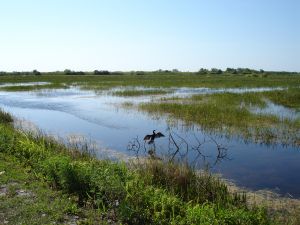Tent Camping in the Florida Everglades
Welcome to today’s AllCampgrounds blog. In this edition we’ll be exploring a topic near and dear to me, tent camping in Florida; specifically, camping opportunities in the fascinating Florida wetlands known as the Everglades. Home to the iconic Florida alligator, this “river of glass” encompasses miles of sawgrass prairie in the southern part of the state. A national park protects about a quarter of the total land, just over one and a half million acres, and provides fantastic camping opportunities. Other camp grounds can be found around Everglades City and Florida City, both nearby.
Camp Grounds and Backcountry Camping in a World Heritage Site
The Everglades area is one of the most important natural environments in the U.S., and is a prominent feature of local politics. Airboats are no longer allowed in the protected region thanks to the potential for disturbing the local wildlife, and RV camping facilities are relatively limited. However, there are hundreds of sites for tent camping available year-round. The in-season runs from December to April, during Florida’s brief, dry winter, when mosquitoes are less likely to be troublesome.
From May to November, intense thunderstorms and heat reaching up to 100 degrees Fahrenheit prevent all but the most avid adventurers from visiting the park, which offers limited services during that time. Animals such as the Florida panther roam freely, making it especially important to understand the unique features of the land. Raised, Native American-inspired “chickees” are used in areas where camping on dry land is impossible, but expert navigational skills are needed to get from site to site. No fires are allowed on chickees or ground sites, and you’ll need a free-standing tent.
Though airboats are no longer permitted, motorboats are still allowed in most Everglades waterways. Canoeing and kayaking is also available, but even skilled paddlers need to realize the weather can put a real crimp in your plans. If it’s your first trip, come “overprepared” and with modest expectations. Better yet, choose a short stay in one of the park’s beach sites, which offer a little more comfort than the average wet-sites: though there is no “camping bathroom”, there are few insects and only one wildcard, the tides. You’ll also be able to build fires as long as they’re below the high tide line.
Campsites and Exploration Opportunities Around the ‘Glades
Not all campsites in the Everglades area are on public land. There are other options, including RV camps, fishing, and airboating outside national park grounds. Everglades Holiday Park is one good option, especially if you want to get “up close and personal” with the Florida gator. There are 36 sites for tent camping and 100 “deluxe” RV sites.
Glades Haven Cozy Cabins is a great way to establish a long-term “base” for a few short excursions into the Everglades. With 17 full-sized cabins offering stove, refrigerator, screened-in porches, and climate controlled rooms, you’ll have a great jumping off point for Everglades adventures; especially since you also get access to a private dock and ample boat rental. Fishing guides and sightseeing tours are also available.
The Everglades isn’t an easy place to camp, but it is truly unique, and one of the best ways to get a glimpse of “true” prehistoric creatures. If you stick with it and give yourself time to master the ins and outs, it can be one of the most satisfying tent camping experiences out there. Just be sure to follow the golden rules of camping: “know before you go” and “leave no trace.”



[...] so call ahead if you have plans in the area. If there’s a shift in conditions, even the Everglades may be endangered. Watch the Florida Department of State Parks for closure [...]
Pingback by All Campgrounds » AllCampgrounds Special News Update: Camping in the “Oil Zone” — May 24, 2010 @ 3:12 am
Camping in the everglades is primitive camping and survival training all in one. Because so many of the trails are unmarked one must have good navigation skills or a GPS to get around easily.
Comment by ATVCamper — March 20, 2011 @ 9:43 am